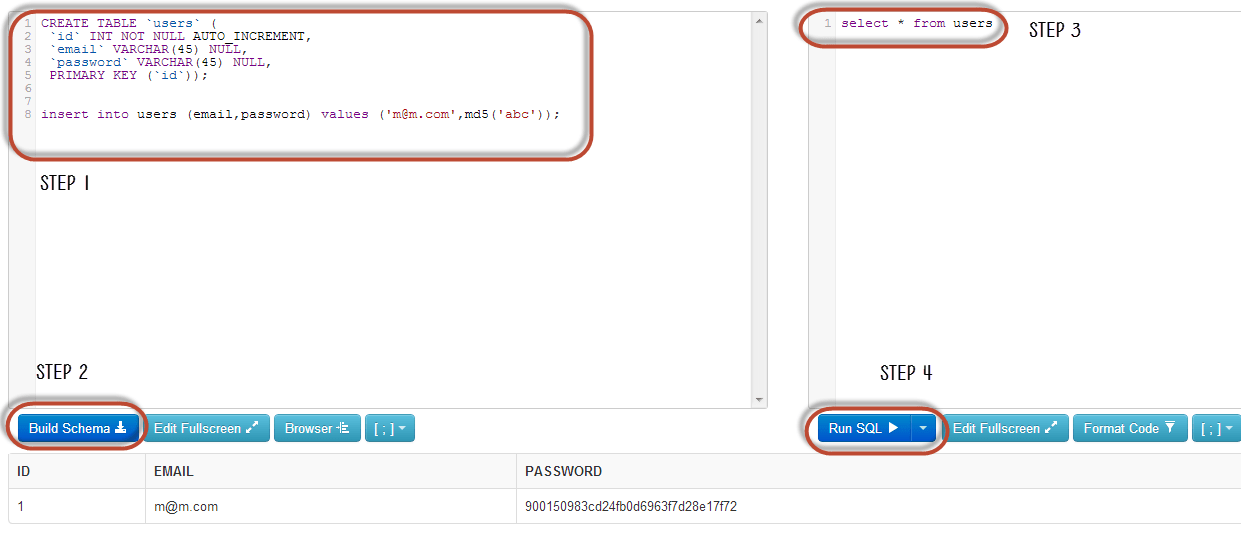

- #Md5 encoding in sql full
- #Md5 encoding in sql verification
- #Md5 encoding in sql code
- #Md5 encoding in sql free
If you're using the DLL on such a system, I would recompile it without that linker option. The output conforms to the algorithm standard: 128 bits (16 bytes) for MD2, MD4, and MD5 160 bits (20 bytes) for SHA and SHA1 256 bits (32 bytes) for SHA2256, and 512 bits (64 bytes) for SHA2512. Performance of such script will be very low.

Unfortunately, SQL Server does not have hash function like md5 and writing T-SQL script is not a good idea too. But in some cases, it’s necessary to implement md5-hash algorithm on SQL Server. This may cause a performance hit on non-NT systems (e.g., Win95, Win98, etc.). It’s very simple to create an md5 hash function in such languages like C or VB.NET. One last thing, I added the linker option /OPT:NOWIN98 to minimize the binary size. The supported hash algorithms include MD2, MD4, MD5, SHA, SHA1. If you want to make it more robust - like if you do not know what kind of data will be passed to the function - then I highly recommend you add those safeguards. SQL Server has built-in function HASHBYTES that can be used to calculate hash values. I also know that I'm always calling the procedure properly. Please help me to understand what the MD5 function above is returning. I opted to exclude that in order to maximize speed, as I originally wrote this for use in an application that inserts millions of rows at a time. When I run the word 'test' through the MD5 function in C, it returns the following: RTYSPVSIIGNYx5++zd8EfNwYAONmPWZnsKaYiQHBCP8 This is not standard Base64 encoding, and I cannot figure out a way to recreate it in SQL for an associated project.
#Md5 encoding in sql verification
FOR SQL_VARIANT: SELECT dbo.fn_md5x(CAST(data AS VARCHAR( 8000)), DATALENGTH(data)) FROM table Miscellaneousįor purposes of speed, I did not include any real input data verification (e.g., type checking, data length checking, etc.). For BINARY: SELECT dbo.fn_md5x(data, 12) FROM table For NCHAR: (we can use LEN() on this fixed-width type to trim the padding) SELECT dbo.fn_md5x(CAST(data AS CHAR( 4000)), LEN(data)) FROM table

For CHAR: (we can use LEN() on this fixed-width type to trim the padding) SELECT dbo.fn_md5x(data, LEN(data)) FROM table For IMAGE: SELECT dbo.fn_md5x(data, DEFAULT) FROM table For VARBINARY: SELECT dbo.fn_md5(CAST(data AS VARCHAR( 8000))) FROM table For TEXT, NTEXT, VARCHAR: SELECT dbo.fn_md5(data) FROM table Use CAST() with caution, as it may truncate and have other unintended consequences.
#Md5 encoding in sql free
Feel free to create your own functions that take the input type you want. These are just examples for use with the given functions above.
#Md5 encoding in sql full
Enter xp_md5 for the "Name" and for the "Path", enter the full path to xp_md5.dll. Right-click "Extended Stored Procedures" under the master database in the Server Manager and click "New Extended Stored Procedure.". If an application stores values from a function such as MD5() or SHA1() that returns a string of hex digits, more efficient storage and comparisons can be. And checking that chart (scroll down to the bottom chart as it has the character names) value 0x82 (look for '82' in the 'Code Point' column) is in fact the.

#Md5 encoding in sql code


 0 kommentar(er)
0 kommentar(er)
